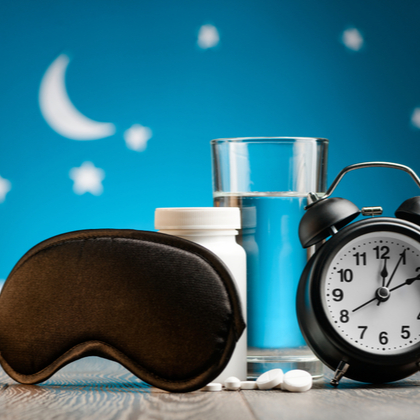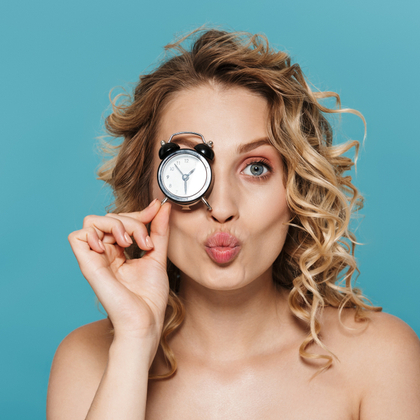
Melatonin plays an important role in controlling the body’s circadian rhythm, or internal body clock. For this reason, some doctors may recommend melatonin supplements to aid conditions such as insomnia due to its ability to induce sleep. If you’re considering using melatonin supplements for sleep, it’s important to understand its benefits and limitations as a supplement. To help, we’ll outline the role of melatonin in the body, as well as some natural alternatives you can take.
How does melatonin affect sleep?
Melatonin's main job in the body is to regulate your sleep-wake cycle. It is produced by your pineal gland in the middle of your brain. The pineal gland reacts to light — which means that it dormant during the day and is active at night.i When the pineal gland is active, it releases melatonin into the blood — typically, around 9pm.ii At this point, you begin to feel lethargic and sleep seems more attractive. Melatonin levels remain elevated in the blood throughout the night and start dissipating before the light of the new day, usually by 9 am.iii It’s also worth noting that you can also find naturally occurring melatonin in foods — sour cherries, pomegranate, sunflower seeds, rolled oats and broccoli, to name a few. Learn more about how melatonin works within your sleep cycle here.
What should I know before taking melatonin supplements?
Given its role in inducing sleep, a synthetic form of melatonin is available on prescription in the UK. But unlike the US — where a recent government study found 3.1 million Americans take melatonin for sleep disorders — melatonin is much less common in the UK.iv Here, melatonin is prescribed to alleviate short-term bouts of insomnia, jet-lag following a long haul flight, and to help regulate the sleep patterns of shift workers. Prescriptions come with strict doses and can only be taken by those aged 55 and over for a time limit of 13 weeks.viii
Sleep experts are, however, divided over the efficacy and safety of using melatonin supplements for sleep. There is some evidence to suggest melatonin may decrease the time it takes to fall asleep. In an analysis of 19 studies, scientists discovered those with severe insomnia fell asleep approximately seven minutes sooner, and slept for eight minutes longer, when taking melatonin supplements.v Researchers also hypothesize melatonin could be used to manage jet lag. According to a 2002 Chocrane review, individuals who travelled across five time zones or more experienced less severe jet lag when taking melatonin close to bedtime at their destination.vii
Nonetheless, researchers at MIT reported that long-term use could undermine how the body responds to the hormone and potentially disrupt sleep in the longrun.vi It would seem then, that melatonin can only offer short-term benefits. Beyond this, melatonin has numerous side effects, too — one of which is fatigue. Taking an incorrect dosage can also exacerbate the original symptoms.
What are the alternatives to melatonin supplements?
For the reasons outlined above, Nature’s Best doesn’t advocate selling or using melatonin supplements to support sleep. Instead, we recommend using the following natural sleep supplements:
Sour Cherry Juice
Sour cherry juice is a rich source of natural melatonin and may be used to promote restful sleep. As such, this is a great alternative to synthetic forms of melatonin prescribed by GPs.
5-HTP
The way 5-HTP helps to support sleep in two ways: by supporting serotonin production, it helps to reduce mood disturbances that are known to interfere with rest, and increase levels of melatonin.
Theanine & Lemonbalm
Theanine & Lemonbalm are known to promote relaxation and calming anxiety — both of which are essential for promoting sleep.
St John’s Wort
Native to Asia, Australia and South America, St John’s Wort has long been used to mitigate symptoms of anxiety — one of which being sleep problems. St John’s Wort contains hypericin and hyperforin — ‘feel-good’ chemical messengers that play a crucial role in balancing mood and
relaxation.
Valerian Root
Comprising of potent compounds and antioxidants, Valerian Root extract has long been used for the temporary relief of stress and sleep disturbances.
Magnesium
Likewise, magnesium regulates the body’s stress response, thereby encouraging relaxation and preparing the body for quality sleep.
Though melatonin is involved in the sleep-wake cycle, taking it in supplement form is not always recommended. As such, it’s important to consult with your GP to decide the right treatment for you — be it medical or natural. To learn more about natural sleep remedies, feel free to browse our sleep hub.
References:
-
Sleepfoundation.org. (2019). Melatonin and Sleep - National Sleep Foundation. Available online: https://www.sleepfoundation.org/articles/melatonin-and-sleep
-
The Sleep Council. (2019). Melatonin and Sleep - The Sleep Council. Available online: https://sleepcouncil.org.uk/sleep-hub/melatonin
-
The Sleep Council. (2019). Melatonin and Sleep - The Sleep Council. Available online: https://sleepcouncil.org.uk/sleep-hub/melatonin
-
NCCIH. (2019). 1.3% of U.S. adults (3.1 million) used Melatonin. Available online: https://nccih.nih.gov/research/statistics/NHIS/2012/natural-products/melatonin
-
Ferracioli-Oda. E., Qawasmi. A. & Bloch. M. (2014). Meta-Analysis: Melatonin for the Treatment of Primary Sleep Disorders. Focus. 12(1), 73-79.
-
Thomson. E.A. (2011). Rest easy: MIT study confirms melatonin's value as sleep aid. Applied PsychologyMIT News. Available online: http://news.mit.edu/2005/melatonin
-
NHS Guy’s and St Thomas’. (2018). Melatonin for the treatment of insomnia. Available online: https://www.guysandstthomas.nhs.uk/resources/patient-information/sleep/melatonin-for-insomnia.pdf
Related Posts

Olivia
Olivia Salter has always been an avid health nut. After graduating from the University of Bristol, she began working for a nutritional consultancy where she discovered her passion for all things wellness-related. There, she executed much of the company’s content marketing strategy and found her niche in health writing, publishing articles in Women’s Health, Mind Body Green, Thrive and Psychologies.
View More



